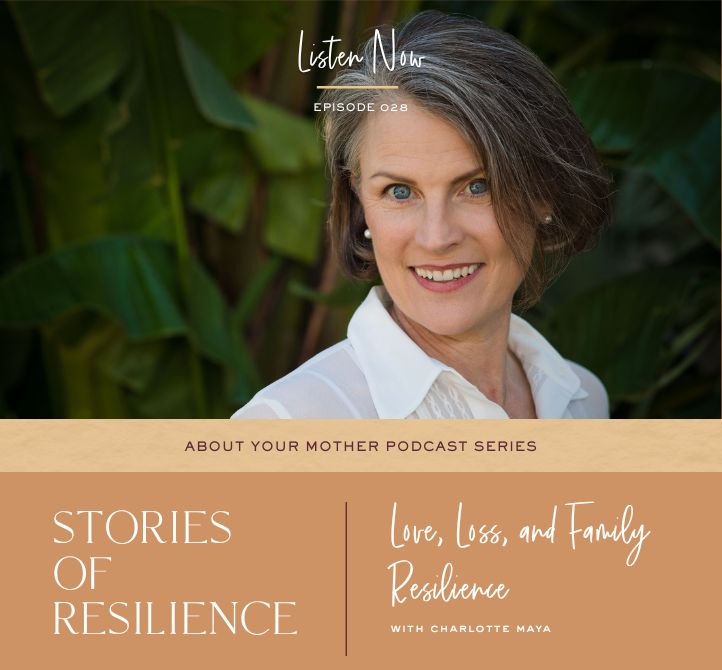In the blink of an eye, Charlotte Maya’s life took an unexpected turn when she lost her husband by suicide, leaving her grappling with a series of emotions. From empathy to rage to overwhelming guilt, she found herself navigating uncharted territory in the wake of tragedy.
Maya’s story is one of resilience and hope, highlighting how being honest with our experience can help others heal. Amidst the darkness, a guiding light emerged, offering a poignant realization that shifted the course of her healing journey. In this episode, we discuss how the power of community and beautiful people are helping hands in the healing journey.
If you or someone you know is struggling with thoughts of suicide, you can find support by dialing 988 for the Suicide & Crisis Lifeline or go to the National Suicide Prevention Lifeline website.
“Grief is like a heavy sandbag at your feet. When you do pick it up, you’ll notice there’s a little hole in the bottom, and that’s where the grains of sand start to fall out. And then two things start to happen. It gets lighter, and you get stronger.”
– Charlotte Maya
About Charlotte Maya
Charlotte Maya, a mother of two, has become a beacon of hope in the face of adversity, embodying resilience and unwavering strength. Charlotte’s life took an unexpected turn when her husband died by suicide. The aftermath left her grappling with a series of emotions, from empathy to rage to overwhelming guilt. However, amidst the darkness, her therapist’s words became a guiding light: “You get 100% of your 50%, and Sam gets 100% of his 50%.”
This poignant realization allowed her to release the burden of self-blame and what-ifs. Charlotte’s journey underscores the vital role of honesty and transparency in the face of loss by suicide, paving the way for healing and resilience.
Her journey through grief and loss has not only shaped her personal growth but has also deeply influenced her parenting philosophy, emphasizing the primal instinct and compassion that arise amidst challenges.
Her story serves as a testament to the transformative power of compassion, self-care, and unwavering community support. In sharing her narrative, Charlotte imparts a message of hope, proving that even in the depths of despair, strength can be found, and healing can emerge from vulnerability.
Understanding Suicide as an Illness
Suicide is a widespread public health issue, and understanding it as an illness can be a significant step towards eradicating stigma and promoting prevention efforts. When Charlotte began to understand and accept suicide as an illness, she became empathetic to Sam and his journey. Although, at the same time, she felt rage. She recognized that Sam had been struggling, yet also had feelings of abandonment—both of those things were true and valid.
Charlotte’s therapist helped guide her into better understanding Sam by offering her this advice, “You get to own 100% of your 50% and Sam gets 100% of his 50%.” The mistake that Sam made was not asking for help, that was his 50%.
Therefore, treating suicide as an illness means viewing it as a mental health condition that can and should be treated through medical interventions, therapies, and support systems. For Charlotte, she’s learned that we can’t solve the problem of suicide with silence—we have to talk about it, so now she is on a mission to help others who may be struggling.
Making an Impact: Sharing Stories of Loss and Resilience
Sharing stories of resilience during times of grief and loss can be profoundly healing and empowering, both for the storyteller and the listener. These narratives serve as a testament to human spirit and fortitude, offering solace and encouraging others navigating similar paths by showcasing they’re not alone.
The act of sharing personal experiences of resilience can spark conversations, increase awareness, and foster more empathetic societies. Charlotte’s story is a compelling example of this concept. Her candid conversation about her grief, resilience, and journey towards healing shed light on the significance of story sharing.
Suicide is one of the leading causes of death in the United States. By speaking openly about her experience, Charlotte is highlighting important mental health discussions that many of us are afraid to approach, offering hope to those in similar scenarios.
Resilience and Hope: A Christmas Gift
Facing a life-altering event, such as the loss of a loved one, can be overwhelming and emotionally draining. Shortly after the loss of her husband and children’s father, Charlotte was met with an experience of hope and kindness. One evening in December, there was a knock on the door, but no one was there, just a gift from a stranger. The gesture was the first of a series of “12 Days of Christmas” gifts for the kids—ultimately being the most enlightening gesture she could have experienced during this time.
While they tried to figure out who this person could have been, they were never successful. After a while, Charlotte stopped focusing on who was doing it and started focusing on the joy in brought her family in the darkest time of their lives. She never figured out who it was. Her hope is that she never finds out who did it, because the impact and sacredness of it was so powerful.
Despite her pain during that time, Charlotte allowed herself to develop resilience and nurse hope for the future. With the help of those around her and the kindness of strangers, she managed to balance her emotions, showing her children that healing is possible and that they have the strength to endure despite the circumstances.
Finding Support for the Healing Journey
Suicide is complicated and the healing process is ongoing—the expereince that Charlotte and her children went through with the loss of Sam will be something they face for the rest of their lives. Accessing support during this process is crucial for emotional well-being.
Emotional support can come from various sources—family, friends, professional counselors, support groups, or even online communities—providing a safe space to share feelings, fears, and aspirations. This network of support can offer valuable advice, perspective, comfort, and essential practical help, fostering resilience and hope.
In Charlotte’s experience, her community—especially a group of friends referred to as ‘the Janes’—stood by her side, offering unconditional love and support throughout her moments of grief. This close-knit community became an essential part of her healing process, illuminating the significance of supportive relationships during bereavement and encouraging open communication about mental health.
If you or someone you know is struggling with thoughts of suicide, here are a few resources:
- Visit the National Suicide Prevention Lifeline website to learn more about the resources available, including the 988 hotline for mental health support.
- Take the time to reach out to a friend or loved one who may be struggling during the holidays. Your gesture of support and connection can make a world of difference.
- Consider incorporating self-care practices into your routine, such as running, yoga, meditation, or other forms of movement and breath work to support your mental health.
- Consider seeking therapy or counseling to receive support and guidance through difficult times.
If you’re looking to bring more awareness to mental health and suicide prevention, consider the following:
- Consider donating to organizations that support mental health and suicide prevention, such as local crisis centers or national organizations like the American Foundation for Suicide Prevention.
- Share Charlotte’s story with others to spread awareness and understanding about the impact of suicide and the importance of community and support in healing.
- Support the message of resilience and hope by engaging in acts of kindness and generosity, no matter how small, during the holiday season and beyond.



